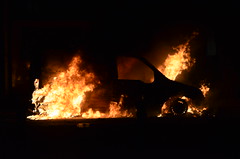Converting schools and universities into facilities that produce commodities for the job market, privatizing them, slashing their budgets — do we really want this future?
The following is a partial transcript of a recent speech delivered by Noam Chomsky at the University of Toronto at Scarborough on the rapid privatization process of public higher education in the United States.

A couple of months ago, I went to Mexico to give talks at the National University in Mexico, UNAM. It's quite an impressive university — hundreds of thousands of students, high-quality and engaged students, excellent faculty. It's free. And the city — Mexico City — actually, the government ten years ago did try to add a little tuition, but there was a national student strike, and the government backed off. And, in fact, there's still an administrative building on campus that is still occupied by students and used as a center for activism throughout the city. There's also, in the city itself, another university, which is not only free but has open admissions. It has compensatory options for those who need them. I was there, too; it's also quite an impressive level, students, faculty, and so on. That's Mexico, a poor country.
Right after that I happened to go to California, maybe the richest place in the world. I was giving talks at the universities there. In California, the main universities — Berkeley and UCLA — they're essentially Ivy League private universities — colossal tuition, tens of thousands of dollars, huge endowment. General assumption is they are pretty soon going to be privatized, and the rest of the system will be, which was a very good system — best public system in the world — that's probably going to be reduced to technical training or something like that. The privatization, of course, means privatization for the rich [and a] lower level of mostly technical training for the rest. And that is happening across the country. Next year, for the first time ever, the California system, which was a really great system, best anywhere, is getting more funding from tuition than from the state of California. And that is happening across the country. In most states, tuition covers more than half of the college budget. It's also most of the public research universities. Pretty soon only the community colleges — you know, the lowest level of the system — will be state-financed in any serious sense. And even they're under attack. And analysts generally agree, I'm quoting, "The era of affordable four-year public universities heavily subsidized by the state may be over."
Read on...








